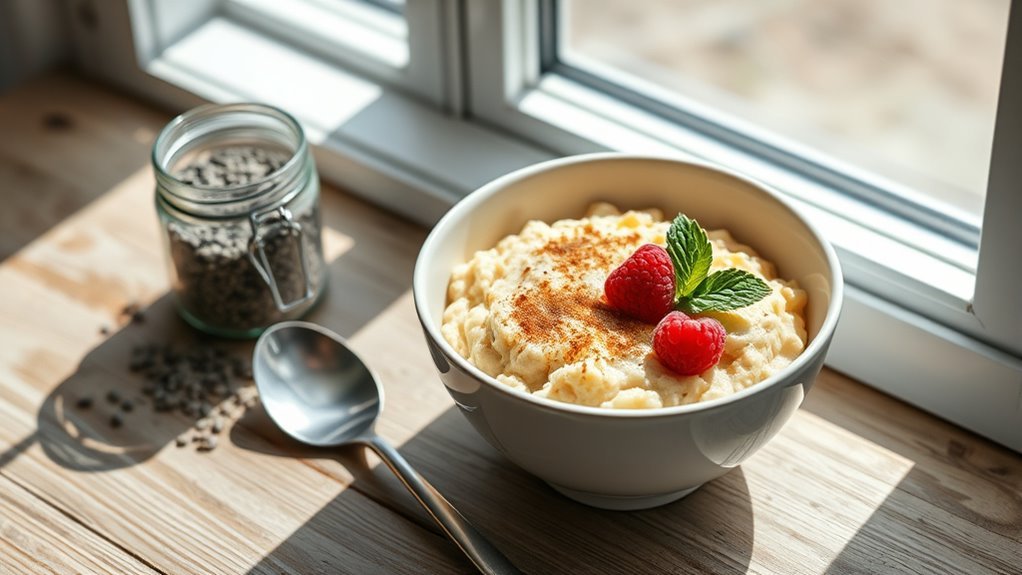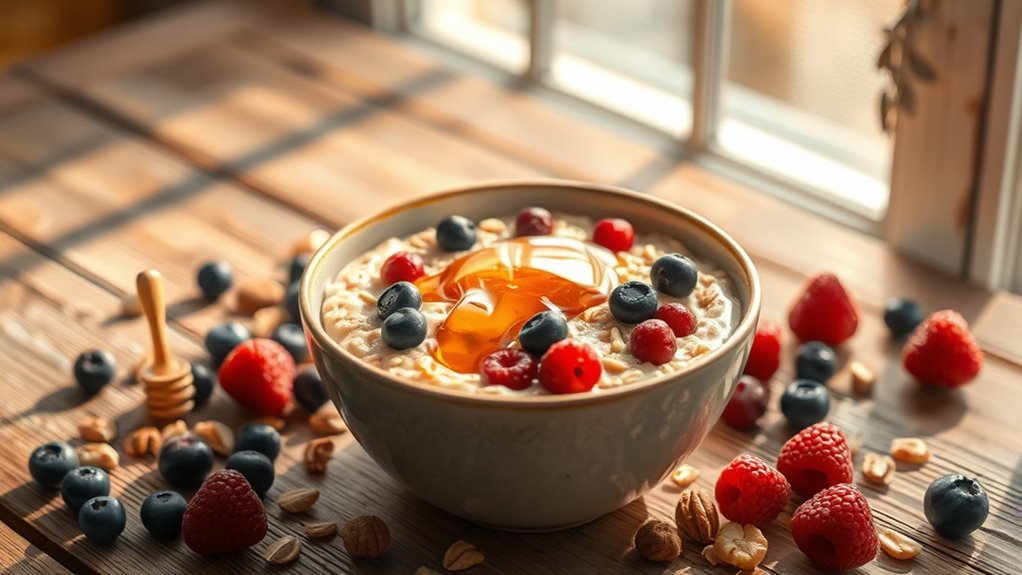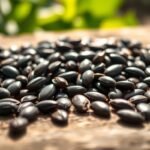Oatmeal is generally not suitable for a strict keto diet due to its high carbohydrate content, which can interfere with ketosis. For instance, even small servings contain significant carbs that can spike blood sugar levels. While oatmeal offers fiber and nutrients, you might want to explore low-carb alternatives like chia seed pudding or flaxseed meals that align better with keto principles. There are various tasty options available, and there’s more to uncover about smart choices on keto.
Understanding the Keto Diet

When you commence on the keto diet, you’re fundamentally shifting your body’s primary energy source from carbohydrates to fats. This change relies on core keto principles, which emphasize high fat, moderate protein, and very low carbohydrate intake. As your body adjusts, it undergoes a process known as fat adaptation, where it learns to efficiently burn fat for energy instead of glucose. This can take several days to weeks and might come with initial challenges, like the “keto flu.” However, once adapted, many people experience increased energy levels and reduced cravings. Embracing the keto lifestyle offers freedom from traditional carb-heavy meals, allowing you to explore a diverse range of satisfying, low-carb foods that align with your health goals. Understanding the ketogenic diet can help you make informed choices about food, including the role of grains such as oatmeal.
Nutritional Profile of Oatmeal

Oatmeal, often celebrated for its heart-healthy benefits, boasts a nutritional profile that’s rich in fiber, vitamins, and minerals. It’s an excellent source of soluble fiber, which can help lower cholesterol and improve digestion. You’ll also find important nutrients like B vitamins, iron, and magnesium, supporting overall health. However, it’s vital to weigh oatmeal drawbacks, particularly its carbohydrate content. While it provides sustained energy, it may not align with strict ketogenic goals, which prioritize low carbohydrate intake. Balancing these oatmeal benefits and drawbacks is key. If you’re looking for a nutritious breakfast, oatmeal can be a great choice, but it’s important to assess how it fits into your dietary preferences and lifestyle.
Carbohydrate Content in Oatmeal

While oatmeal is often praised for its health benefits, understanding its carbohydrate content is essential, especially for those following a ketogenic diet. Oatmeal’s carbohydrate content can be a drawback when you’re trying to limit carbs. Here’s a breakdown of the carbohydrate content in different types of oatmeal:
| Type of Oatmeal | Carbs (per 100g) | Fiber (per 100g) |
|---|---|---|
| Instant Oatmeal | 67g | 6g |
| Rolled Oats | 66g | 10g |
| Steel-Cut Oats | 60g | 8g |
| Oat Bran | 66g | 15g |
| Oat Flour | 70g | 7g |
While the benefits of oatmeal include fiber and nutrients, its high carb content can be a drawback for those on keto. Additionally, the high carbohydrate content of oatmeal can hinder maintaining ketosis, making it less suitable for strict keto dieters.
Impact of Oatmeal on Ketosis
Those following a ketogenic diet must be mindful of how various foods can impact their state of ketosis. Oatmeal, while nutritious, can notably affect your ketosis effects due to its carbohydrate content. When you consume oatmeal, your body goes through oatmeal digestion, breaking down those carbs into glucose, which can kick you out of ketosis. Even small portions can add up quickly, making it vital to monitor your intake. If you’re seeking to maintain ketosis, it’s important to weigh the benefits of fiber and nutrients against the potential for increased blood sugar levels. Ultimately, understanding how oatmeal influences your body can help you make informed choices that align with your keto goals while still enjoying food freedom.
Low-Carb Oatmeal Alternatives
If you’re looking for low-carb alternatives to oatmeal, chia seed pudding and flaxseed meal bowls are excellent options. Both are rich in fiber and healthy fats, making them satisfying choices that fit well within a keto diet. Plus, they offer a variety of flavors and textures to keep your breakfast enjoyable while staying low in carbs. These alternatives can provide a similar creamy, oatmeal-like consistency without the high carbohydrate content that traditional oatmeal contains.
Chia Seed Pudding
Chia seed pudding serves as a nutritious and satisfying low-carb alternative to traditional oatmeal, especially for those following a ketogenic diet. Packed with fiber, chia seeds support digestive health while keeping you feeling full longer. The pudding benefits don’t stop there; they’re also rich in omega-3 fatty acids, promoting heart health. With only 1 gram of net carbs per serving, chia nutrition aligns perfectly with keto-friendly meals, allowing you to indulge without guilt. You can easily customize your pudding with various toppings—like nuts or berries—tailoring it to your taste while maintaining its low-carb status. Additionally, the high fiber content in chia seeds contributes to digestive health by promoting regularity and gut well-being. So, if you’re seeking a versatile, healthy breakfast option, chia seed pudding might just be the freedom you’re looking for on your keto journey.
Flaxseed Meal Bowl
A flaxseed meal bowl is an excellent low-carb alternative for anyone missing the comforting texture of traditional oatmeal on a ketogenic diet. Packed with nutrients, flaxseed offers numerous health benefits that can enhance your wellness journey.
Consider these flaxseed benefits:
- High in Omega-3 Fatty Acids: Supporting heart health and reducing inflammation.
- Rich in Fiber: Aiding digestion and promoting a feeling of fullness.
- Loaded with Lignans: Offering antioxidant properties that may support hormone balance.
You can easily incorporate flaxseed into your morning routine with simple flaxseed recipes. Just mix ground flaxseed with hot water or almond milk, add your favorite low-carb toppings, and enjoy a nutritious bowl that won’t derail your keto lifestyle. Additionally, flaxseed is high in fiber, which can promote digestive health and keep you feeling satisfied throughout the morning.
Modifying Oatmeal Recipes for Keto
While traditional oatmeal is often a staple for those seeking a healthy breakfast, modifying oatmeal recipes for a keto diet can be both simple and delicious. You can make keto adaptations by replacing oats with oatmeal substitutes like chia seeds, flaxseed meal, or hemp hearts. These alternatives are low in carbs and high in fiber, helping you feel full longer while keeping your carbohydrate intake in check. Adding unsweetened almond milk or coconut cream can enhance creaminess without the extra carbs. For sweetness, use natural keto-friendly sweeteners like stevia or erythritol. With these adjustments, you can enjoy a satisfying breakfast that aligns with your keto lifestyle, allowing you the freedom to indulge without compromising your dietary goals. Limiting carbs is crucial for success on the ketogenic diet, ensuring you stay within your carb limits for effective weight loss.
Benefits of Oatmeal in a Balanced Diet
When you include oatmeal in a balanced diet, you’re not just enjoying a tasty breakfast; you’re also reaping a multitude of health benefits. Oatmeal is a powerful source of nutrients that supports your overall health. Here are some oatmeal benefits you might appreciate:
- Rich in Fiber: It promotes digestive health and helps you feel full longer.
- Heart Health: Oatmeal contains beta-glucans, which can lower cholesterol levels and reduce heart disease risk.
- Nutrient-Dense: Packed with vitamins and minerals, oatmeal contributes to balanced nutrition, providing essential nutrients like magnesium and iron.
Incorporating oatmeal into your meals can enhance your wellness journey and keep you energized throughout the day. It’s a simple yet effective way to nourish your body!
Making Informed Choices on Keto
When you’re on a keto diet, understanding oatmeal’s nutritional profile is essential for making informed choices. You’ll want to take into account its carb count and how it fits into your daily limits, as well as explore alternative breakfast options that align better with keto principles. By weighing these factors, you can guarantee your meals support your health goals effectively. Additionally, focusing on low-glycemic carbs can help you maintain better blood sugar control while following a ketogenic diet.
Oatmeal Nutritional Analysis
Oatmeal, often hailed as a wholesome breakfast option, presents a unique challenge for those following a ketogenic diet. While it offers several oatmeal benefits, understanding its nutritional profile is vital for making informed choices. Here’s a brief nutritional analysis:
- Rich in fiber, which can aid digestion and promote satiety.
- Contains essential vitamins and minerals, contributing to overall health.
- Lower in protein compared to other keto-friendly options, which might not support your goals effectively.
Additionally, its high carb content can lead to blood sugar spikes, making it less suitable for those aiming to maintain ketosis.
When you weigh these oatmeal benefits against the nutritional comparisons to keto-approved foods, you’ll find that while oatmeal has merits, it may not align with your carb restrictions. Always consider your personal dietary goals when deciding!
Carb Count Considerations
While it’s tempting to indulge in a warm bowl of oatmeal, understanding its carb count is essential for anyone adhering to a ketogenic diet. Traditional oatmeal is high in carbohydrates, typically containing around 27 grams per cup, which can quickly sabotage your daily carb limits. However, keto flexibility allows you to make informed choices. If you love oatmeal, consider portion control and carb counting to fit it into your meal plan occasionally. You might explore lower-carb alternatives, like chia seeds or flaxseed meal, to satisfy that warm breakfast craving while staying within your carb limits. Ultimately, it’s about balancing your desires with your dietary goals, ensuring you enjoy your meals without compromising your keto journey. Additionally, be mindful of oat milk’s higher carbohydrate content as it may also impact your daily limits.
Alternative Breakfast Options
If you’re seeking alternatives for breakfast on a keto diet, you have plenty of delicious options that won’t derail your carb goals. Here are three satisfying choices that keep your taste buds happy while adhering to keto principles:
- Breakfast Smoothies: Blend leafy greens, avocado, unsweetened almond milk, and a scoop of protein powder for a creamy, low-carb delight.
- Egg Muffins: Whisk eggs with veggies, cheese, and cooked meats, then bake in muffin tins for portable and protein-packed bites.
- Chia Seed Pudding: Combine chia seeds with coconut milk and let it sit overnight for a nutritious, low-carb breakfast option.
These alternatives not only offer variety but also guarantee you stay on track with your keto journey without sacrificing flavor! Additionally, incorporating healthy fats into your meals will help maintain energy and overall health.
Frequently Asked Questions
Can I Include Oatmeal in My Intermittent Fasting Routine?
Yes, you can include oatmeal in your intermittent fasting routine, but it’s important to evaluate its compatibility with your goals. Oatmeal offers several health benefits, like sustained energy and fiber, which can enhance your fasting experience. However, if you’re following a strict keto diet, oatmeal’s carb content might not align with your goals. Balancing these factors allows you the freedom to choose what fits best for your body and lifestyle.
How Can I Satisfy Cravings for Oatmeal on Keto?
If you’re craving oatmeal on keto, don’t worry! You can satisfy that craving with oatmeal substitutes like chia seeds or flaxseed meal, which offer a similar texture but are low in carbs. You might think you can’t enjoy a warm, hearty breakfast, but these alternatives provide healthy fats and fiber, keeping you full. Try mixing them with unsweetened almond milk and your favorite low-carb sweeteners for a delicious, guilt-free option!
Are There Any Keto-Friendly Oatmeal Brands Available?
Yes, there are keto-friendly oatmeal brands available! Look for products made from low carb grains like chia seeds, flaxseed, or coconut flour. Brands like “Keto Oatmeal” and “Good Good” offer options that mimic traditional oatmeal while keeping the carb count low. These alternatives can help you satisfy your cravings without derailing your diet. Just be certain to check the nutrition labels to confirm they fit your keto goals. Enjoy your breakfast freedom!
What Toppings Can I Use to Enhance Keto Oatmeal?
Did you know that nearly 30% of people on the keto diet miss their favorite breakfast foods? You can enhance your keto oatmeal with various delicious toppings! Try adding almond butter, unsweetened coconut flakes, or berries for a burst of flavor. If you’re looking for oatmeal alternatives, consider chia seeds or flaxseed meal. These not only add texture but also boost your fiber intake, making your breakfast both satisfying and nutritious.
Can I Eat Oatmeal and Still Lose Weight on Keto?
You can’t eat oatmeal and still effectively lose weight on keto, as it’s high in carbs. Instead, consider oatmeal alternatives like chia seeds or flaxseed meal, which are low in carbs and rich in fiber. These options can help you feel full while supporting your keto weight loss goals. Remember, sticking to low-carb foods is key on this diet, so explore creative substitutes that satisfy your cravings without derailing your progress.
Frequently Asked Questions about Oatmeal on Keto
1. Can I eat oatmeal while following a keto diet?
While traditional oatmeal is typically high in carbohydrates, making it unsuitable for a strict ketogenic diet, there are alternatives that can be incorporated in moderation. For instance, products like oat fiber or low-carb oatmeal options (such as those made from chia seeds or flaxseeds) may fit into your keto meal plan. Always check the nutritional information to stay within your carb limits.
2. What are the carb counts for regular oatmeal?
A typical serving of cooked oatmeal (about 1 cup) contains approximately 27 grams of carbohydrates, with around 4 grams of fiber. This means the net carbs are roughly 23 grams per serving, which can be too high for a standard keto diet that usually restricts daily carb intake to about 20-50 grams.
3. Are there any keto-friendly oatmeal alternatives?
Yes, there are several keto-friendly alternatives to traditional oatmeal. Some popular options include chia seed pudding, flaxseed meal porridge, or using a blend of almond flour and coconut flour to create a low-carb cereal. These alternatives can provide similar textures and flavors while keeping your carb intake low.
4. How can I incorporate oatmeal into a low-carb diet?
If you want to include oatmeal in a low-carb diet, consider using small portions of low-carb oatmeal or oatmeal alternatives mentioned above. You can also mix in healthy fats like nuts, seeds, or nut butter to enhance the nutritional profile and help you stay fuller longer. Always monitor your overall carbohydrate intake to ensure you remain in ketosis.
5. What should I watch out for when considering oatmeal on keto?
When considering oatmeal on a keto diet, it’s crucial to watch your portion sizes and the total carbohydrate content. Traditional oatmeal can quickly consume your daily carb allowance, so it’s best to avoid it altogether or opt for low-carb alternatives. Additionally, be cautious of added sugars and high-carb toppings, such as fruits or syrups, which can significantly increase the carb count.
References
- https://www.healthline.com/nutrition/oatmeal-on-keto
- https://www.ruled.me/oatmeal-keto/
- https://www.webmd.com/diet/what-is-the-ketogenic-diet
- https://www.mayoclinic.org/healthy-lifestyle/nutrition-and-healthy-eating/in-depth/keto-diet/art-20460287
- https://www.ncbi.nlm.nih.gov/pmc/articles/PMC6836143/
- https://www.verywellfit.com/the-ketogenic-diet-5119073


